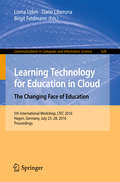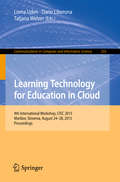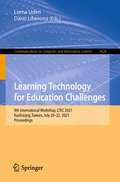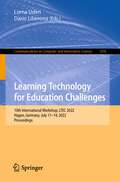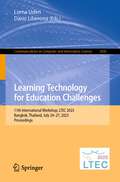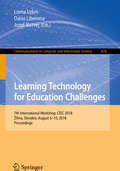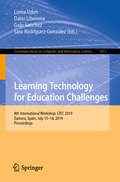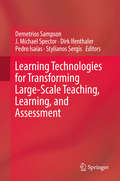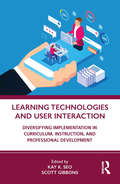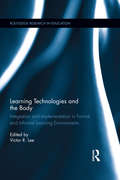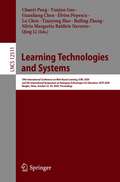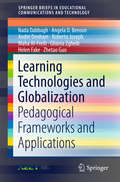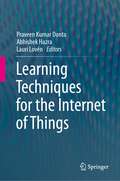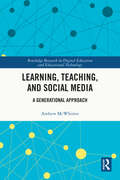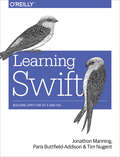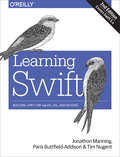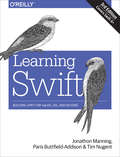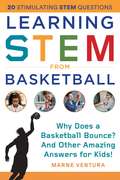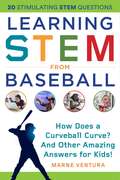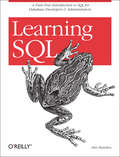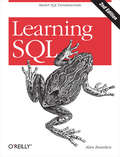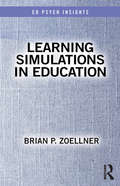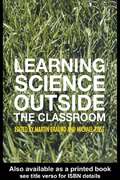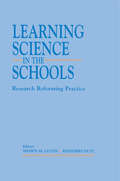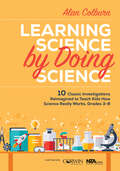- Table View
- List View
Learning Technology for Education in Cloud - The Changing Face of Education
by Lorna Uden Dario Liberona Birgit FeldmannThis book constitutes the refereed proceedings of the 5th International Workshop on Learning Technology for Education in Cloud, LTEC 2016, held in Maribor, Slovenia, in July 2016. The 25 revised full papers presented were carefully reviewed and selected from 51 submissions. The papers are organized in topical sections on learning technologies; learning tools and environment; MOOC for learning; problem solving and knowledge transfer; case study.
Learning Technology for Education in Cloud
by Lorna Uden Dario Liberona Tatjana WelzerThis book constitutes the refereed proceedings of the Fourth International Workshop on Learning Technology for Education in Cloud, LTEC 2015, held in Maribor, Slovenia, in August 2015. The 24 revised full papers presented were carefully reviewed and selected from 46 submissions. The papers cover various aspects of technologies for learning, such as MOOC challenges; cooperative learning; learning engineering; learning tools and environments; STEM.
Learning Technology for Education Challenges: 9th International Workshop, LTEC 2021, Kaohsiung, Taiwan, July 20-22, 2021, Proceedings (Communications in Computer and Information Science #1428)
by Lorna Uden Dario LiberonaThis book constitutes the refereed proceedings of the 9th International Workshop on Learning Technology for Education Challenges, LTEC 2021, held in Kaohsiung, Taiwan, in July 2021. The 11 revised full papers and 6 short papers presented were carefully reviewed and selected from 83 submissions. The papers are organized in the following topical sections: learning tools and environment; e-learning and transferability strategies; serious games technologies; learning practices and knowledge transfer.
Learning Technology for Education Challenges: 10th International Workshop, LTEC 2022, Hagen, Germany, July 11–14, 2022, Proceedings (Communications in Computer and Information Science #1595)
by Lorna Uden Dario LiberonaThis book constitutes the refereed proceedings of the 10th International Workshop on Learning Technology for Education Challenges, LTEC 2022, held in Hagen, Germany, in July 2022. The 14 revised full papers and 6 short papers presented were carefully reviewed and selected from 41 submissions. The papers are organized in the following topical sections: learning methodologies and pandemic impact; learning practices and methodologies; learning technologies; learning technologies performance; serious games and virtual learning environments.
Learning Technology for Education Challenges: 11th International Workshop, LTEC 2023, Bangkok, Thailand, July 24–27, 2023, Proceedings (Communications in Computer and Information Science #1830)
by Lorna Uden Dario LiberonaThis book constitutes the refereed proceedings of the International Workshop on Learning Technology for Education Challenges, LTEC 2023, held in Bangkok, Thailand, during July 24–27, 2023.The 27 full papers included in this book were carefully reviewed and selected from 53 submissions. They were organized in topical sections as follows: serious games and virtual learning environments; learning practices and methodologies; learning technologies; learning mehtodologies and models; learning technologies performance.
Learning Technology for Education Challenges: 7th International Workshop, LTEC 2018, Žilina, Slovakia, August 6–10, 2018, Proceedings (Communications in Computer and Information Science #870)
by Lorna Uden Dario Liberona Jozef RistvejThis book constitutes the refereed proceedings of the 7th International Workshop on Learning Technology for Education Challenges, LTEC 2018, held in Žilina, Slovakia, in August 2018. The 25 revised full papers presented were carefully reviewed and selected from 54 submissions. The papers are organized in the following topical sections: Gamification and learning; learning and knowledge transfer; learning technologies applications; virtual learning environments; and mobile learning and MOOCs. LTEC 2018 examines how these technologies and pedagogical advances can be used to change the way teachers teach and students learn, while giving special emphasis to the pedagogically effective ways we can harness these new technologies in education.
Learning Technology for Education Challenges: 8th International Workshop, LTEC 2019, Zamora, Spain, July 15–18, 2019, Proceedings (Communications in Computer and Information Science #1011)
by Lorna Uden Dario Liberona Galo Sanchez Sara Rodríguez-GonzálezThis book constitutes the refereed proceedings of the 8th International Workshop on Learning Technology for Education Challenges, LTEC 2019, held in Zamora, Spain, in July 2019.The 41 revised full papers presented were carefully reviewed and selected from 83 submissions. The papers are organized in the following topical sections: learning technolgies; learning tools and environment; e-learning and MOOCs; learning practices; social media learning tools; machine learning and evaluation support programs. LTEC 2019 examines how these technologies and pedagogical advances can be used to change the way teachers teach and students learn, while giving special emphasis to the pedagogically effective ways we can harness these new technologies in education.
Learning Technologies for Transforming Large-Scale Teaching, Learning, and Assessment
by Dirk Ifenthaler J. Michael Spector Pedro Isaías Demetrios Sampson Stylianos SergisThis volume provides a contemporary glance at the drastically expanding field of delivering large-scale education to unprecedented numbers of learners. It compiles papers presented at the CELDA (Cognition and Exploratory Learning in the Digital Age) conference, which has a goal of continuing to address these challenges and promote the effective use of new tools and technologies to support teaching, learning and assessment. Given the emerging global trend to exploit the potential of existing digital technologies to improve the teaching, learning and assessment experiences for all learners in real-life contexts, this topic is a unifying theme for this volume.The book showcases how emerging educational technologies and innovative practices have been used to address core global educational challenges. It provides state-of-the-art insights and case studies of exploiting innovative learning technologies, including Massive Open Online Courses and educational data analytics, to address key global challenges spanning from online Teacher Education to large-scale coding competence development. This volume will be of interest to academics and professional practitioners working in the area of digital technology integration in teaching, learning and assessment, as well as those interested in specific conference themes (e.g., designing and assessing learning in online environments, assessing learning in complex domains) and presenters, invited speakers, and participants of the CELDA conference.
Learning Technologies and User Interaction: Diversifying Implementation in Curriculum, Instruction, and Professional Development
by Kay K. Seo Scott GibbonsLearning Technologies and User Interaction explores the complex interplay between educational technologies and those who rely on them to construct knowledge and develop skills. As learning and training continue to move onto digital platforms, tools such as artificial intelligence, predictive analytics, video games, virtual reality, and more hold considerable potential to foster advanced forms of synergy across contexts. Showcasing a variety of contributors who are attuned to today’s networked technologies, environments, and learning dynamics, this book is ideal for students and scholars of educational technology, instructional design, professional development, and research methods.
Learning Technologies and the Body: Integration and Implementation In Formal and Informal Learning Environments (Routledge Research in Education #135)
by Victor R. LeeThis volume explores how technology-supported learning environments can incorporate physical activity and interactive experiences in formal education. It presents cutting-edge research and design work on a new generation of "body-centric" technologies such as wearable body sensors, GPS tracking devices, interactive display surfaces, video game controller devices, and humanlike avatars. Contributors discuss how and why each of these technologies can be used in service of learning within K-12 classrooms and at home, in museums and online. Citing examples of empirical evidence and specific implementation, this timely and critical volume examines how body responsive technologies are being used within the educational community to advance the next generation of educational technology.
Learning Technologies and Systems: 19th International Conference on Web-Based Learning, ICWL 2020, and 5th International Symposium on Emerging Technologies for Education, SETE 2020, Ningbo, China, October 22–24, 2020, Proceedings (Lecture Notes in Computer Science #12511)
by Qing Li Elvira Popescu Yunjun Gao Lu Chen Tianyong Hao Chaoyi Pang Guanliang Chen Bailing Zhang Silvia Margarita Baldiris NavarroThis book constitutes the refereed conference proceedings of the 19th International Conference on Web-Based Learning, ICWL 2020, and 5th International Symposium on Emerging Technologies for Education, SETE 2020, held in Ningbo, China in October 2020.Together for the ICWL 2020 Conference and SETE 2020 Symposium 39 full papers were accepted together with 31 short papers out of 233 submissions. The papers focus on the following subjects: Semantic Web for E-Learning, through Learning Analytics, Computer-Supported Collaborative Learning, Assessment, Pedagogical Issues, E-learning Platforms, and Tools, to Mobile Learning and much more.
Learning Technologies and Globalization
by Nada Dabbagh Angela D. Benson André Denham Roberto Joseph Maha Al-Freih Ghania Zgheib Helen Fake Zhetao GuoThis brief describes the evolutionary and global impact of the techno-social transformation on learning technologies in terms of emerging pedagogical frameworks and applications. it provides examples of such applications in higher education, K-12, and the workplace, across the globe. The transformation and diffusion of ICT into an ever-present and accessible phenomenon is fundamentally shaping human activity and culture, changing human identity, and redefining globalization. Global activities have widened, intensified, and accelerated as a result of ICT integration generating a new awareness of the world as a techno-social environment. This emergent global environment is introducing unprecedented socio-economic opportunities; however, it is also bringing new risks and challenges, particularly as this relates to learning technologies, most especially in higher education contexts.
Learning Techniques for the Internet of Things
by Praveen Kumar Donta Abhishek Hazra Lauri LovénThe book is structured into thirteen chapters; each comes with its own dedicated contributions and future research directions. Chapter 1 introduces IoT and the use of Edge computing, particularly cloud computing, and mobile edge computing. This chapter also mentions the use of edge computing in various real-time applications such as healthcare, manufacturing, agriculture, and transportation. Chapter 2 motivates mathematical modeling for federated learning systems with respect to IoT and its applications. Further Chapter 3 extends the discussion of federated learning for IoT, which has emerged as a privacy-preserving distributed machine learning approach. Chapter 4 provides various machine learning techniques in Industrial IoT to deliver rapid and accurate data analysis, essential for enhancing production quality, sustainability, and safety. Chapter discusses the potential role of data-driven technologies, such as Artificial Intelligence, Machine Learning, and Deep Learning, focuses on their integration with IoT communication technologies. Chapter 6 presents the requirements and challenges to realize IoT deployments in smart cities, including sensing infrastructure, Artificial Intelligence, computing platforms, and enabling communications technologies such as 5G networks. To highlight these challenges in practice, the chapter also presents a real-world case study of a city-scale deployment of IoT air quality monitoring within Helsinki city. Chapter 7 uses digital twins within smart cities to enhance economic progress and facilitate prompt decision-making regarding situational awareness. Chapter 8 provides insights into using Multi-Objective reinforcement learning in future IoT networks, especially for an efficient decision-making system. Chapter 9 offers a comprehensive review of intelligent inference approaches, with a specific emphasis on reducing inference time and minimizing transmitted bandwidth between IoT devices and the cloud. Chapter 10 summarizes the applications of deep learning models in various IoT fields. This chapter also presents an in-depth study of these techniques to examine new horizons of applications of deep learning models in different areas of IoT. Chapter 11 explores the integration of Quantum Key Distribution (QKD) into IoT systems. It delves into the potential benefits, challenges, and practical considerations of incorporating QKD into IoT networks. In chapter 12, a comprehensive overview regarding the current state of quantum IoT in the context of smart healthcare is presented, along with its applications, benefits, challenges, and prospects for the future. Chapter 13 proposes a blockchain-based architecture for securing and managing IoT data in intelligent transport systems, offering advantages like immutability, decentralization, and enhanced security.
Learning, Teaching, and Social Media: A Generational Approach (Routledge Research in Digital Education and Educational Technology)
by Andrew McWhirterEmploying a unique generational approach, this book critically assesses social media in educational contexts across all educational levels: from primary and secondary schools to further and higher education, proposing a schema for social media literacy (SML). Using research obtained from fieldwork observations conducted in online teaching groups, surveys, and in-depth interviews with teachers and educators on the topic of social media and education, chapters interrogate the historical relationship between educator and learner, and use the frame of expert methodology to understand what educators themselves consider important about social media and education relative to their sectors. Bringing together current literature from education, learning and media technologies, along with longstanding debates around technological influence, chapters also draw on audience and communication studies, psychology and arts and humanities at a time when many different disciplines are trying to understand what social media means to our society. This interdisciplinary volume will be of great interest to academics, researchers and postgraduates in the fields of technology in education, media literacy, and critical digital media. Practitioners involved in the sociology of education will also find the book of use.
Learning Swift: Building Apps for OS X and iOS
by Paris Buttfield-Addison Tim Nugent Jon ManningGet hands-on experience with Apple’s Swift programming language by building real working apps. With this practical guide, skilled programmers with little or no knowledge of Apple development will learn how to code with Swift 2 by developing three complete, tightly linked versions of the Notes application for the OS X, iOS, and watchOS platforms.In the process, you’ll learn Swift’s fundamentals, including its syntax and features, along with the basics of the Cocoa, CocoaTouch, and WatchKit frameworks. This book teaches you how to use common design patterns for Swift, how to structure an application for Apple’s platforms, and how to submit working apps to the App Store. Divided into four distinct parts, this book includes: Swift 2 basics: Learn Swift’s features for object-oriented development, as well as various developer tools; OS X app development: Set up your app, work with its documents, and build out its features; iOS app development: Use multimedia, contacts, location, notifications, and iCloud files to build a fully featured iOS Notes app; Advanced app extensions: Support Apple Watch and learn how to debug, monitor, and test all three of your Swift apps
Learning Swift: Building Apps for macOS, iOS, and Beyond (2nd Edition)
by Jon Manning Paris Buttfield-Addison Tim NugentGet valuable hands-on experience with Swift 3, the latest version of Apple’s programming language. With this practical guide, skilled programmers with little or no knowledge of Apple development will learn how to code with Swift 3 by developing three complete, tightly linked versions of the Notes application for the OS X, iOS, and watchOS platforms.In the process, you’ll learn Swift’s fundamentals, including its syntax and features, along with the basics of the Cocoa, CocoaTouch, and WatchKit frameworks. This book teaches you how to use common design patterns for Swift, how to structure an application for Apple’s platforms, and how to submit working apps to the App Store.Divided into four distinct parts, this book includes: Swift 2 basics: Learn Swift’s basic building blocks and features for object-oriented development; OS X app development: Set up the document model, build out features, and sync data with iCloud; iOS app development: Use multimedia, contacts, location, notifications, and iCloud files to build a fully featured iOS Notes app; Advanced app extensions: Build an Apple Watch app, and learn how to debug, monitor, and test all three of your Swift apps
Learning Swift: Building Apps for macOS, iOS, and Beyond (3rd Edition)
by Jonathon Manning Paris Buttfield-Addison Tim NugentGet valuable hands-on experience with Swift, the open source programming language developed by Apple. With this practical guide, skilled programmers with little or no knowledge of Apple development will learn how to code with the latest version of Swift by developing a working iOS app from start to finish.You’ll begin with Swift programming basics—including guidelines for making your code "Swifty"—and learn how to work with Xcode and its built-in Interface Builder. Then you’ll dive step-by-step into building and customizing a basic app for taking, editing, and deleting selfies. You’ll also tune and test the app for performance and manage the app’s presence in the App Store.Divided into four parts, this book includes: Swift 4 basics: Learn Swift’s basic building blocks and the features of object-oriented development; Building the Selfiegram app: Build model objects and the UI for your selfie app and add location support, user settings, and notifications; Polishing Selfiegram: Create a theme and support for sharing and add custom views, image overlays, and localization; Beyond app development: Debug and performance test with Xcode, automate chores with Fastlane, and user-test the app with TestFlight
Learning STEM from Basketball: Why Does a Basketball Bounce? And Other Amazing Answers for Kids! (STEM Sports)
by Marne VenturaGet your sports-loving kid excited about Science, Technology, Engineering, and Math By integrating the thrill of learning into the context of basketball, Learning STEM from Basketball presents an educational slam dunk. Unleash the inner scientist, engineer, and mathematician in your child as they learn that sports and STEM aren't so separate after all. You'll both love finding out the answers to questions such as: Why does a basketball bounce?What's a shot clock?Why does a basketball rim have a net?What's the math behind a free throw?And so much more! This easy-to-follow introduction to STEM topics sets kids up to make connections across subjects, discover new facts about basketball, and grow curious about academic fields!
Learning STEM from Baseball: How Does a Curveball Curve? And Other Amazing Answers for Kids! (STEM Sports)
by Marne VenturaGet your sports-loving kid excited about Science, Technology, Engineering, and Math By integrating the thrill of learning into the context of baseball, Learning STEM from Baseball presents a whole new ball game. Unleash the inner scientist, engineer, and mathematician in your child as they learn that sports and STEM aren't so separate after all. You'll both love finding out the answers to questions such as: What's a sweet spot?When was the pitching machine invented?How are baseballs made?How do numbers help baseball players? What are some STEM careers in baseball?And so much more! This easy-to-follow introduction to STEM topics sets kids up to make connections across subjects, discover new facts about baseball, and grow curious about academic fields!
Learning SQL
by Alan BeaulieuSQL (Structured Query Language) is a standard programming language for generating, manipulating, and retrieving information from a relational database. If you're working with a relational database--whether you're writing applications, performing administrative tasks, or generating reports--you need to know how to interact with your data. Even if you are using a tool that generates SQL for you, such as a reporting tool, there may still be cases where you need to bypass the automatic generation feature and write your own SQL statements.To help you attain this fundamental SQL knowledge, look to Learning SQL, an introductory guide to SQL, designed primarily for developers just cutting their teeth on the language. Learning SQL moves you quickly through the basics and then on to some of the more commonly used advanced features. Among the topics discussed:The history of the computerized databaseSQL Data Statements--those used to create, manipulate, and retrieve data stored in your database; example statements include select, update, insert, and deleteSQL Schema Statements--those used to create database objects, such as tables, indexes, and constraintsHow data sets can interact with queriesThe importance of subqueriesData conversion and manipulation via SQL's built-in functionsHow conditional logic can be used in Data StatementsBest of all, Learning SQL talks to you in a real-world manner, discussing various platform differences that you're likely to encounter and offering a series of chapter exercises that walk you through the learning process. Whenever possible, the book sticks to the features included in the ANSI SQL standards. This means you'll be able to apply what you learn to any of several different databases; the book covers MySQL, Microsoft SQL Server, and Oracle Database, but the features and syntax should apply just as well (perhaps with some tweaking) to IBM DB2, Sybase Adaptive Server, and PostgreSQL.Put the power and flexibility of SQL to work. With Learning SQL you can master this important skill and know that the SQL statements you write are indeed correct.
Learning SQL: Master SQL Fundamentals
by Alan BeaulieuUpdated for the latest database management systems -- including MySQL 6.0, Oracle 11g, and Microsoft's SQL Server 2008 -- this introductory guide will get you up and running with SQL quickly. Whether you need to write database applications, perform administrative tasks, or generate reports, Learning SQL, Second Edition, will help you easily master all the SQL fundamentals.Each chapter presents a self-contained lesson on a key SQL concept or technique, with numerous illustrations and annotated examples. Exercises at the end of each chapter let you practice the skills you learn. With this book, you will:Move quickly through SQL basics and learn several advanced featuresUse SQL data statements to generate, manipulate, and retrieve dataCreate database objects, such as tables, indexes, and constraints, using SQL schema statementsLearn how data sets interact with queries, and understand the importance of subqueriesConvert and manipulate data with SQL's built-in functions, and use conditional logic in data statementsKnowledge of SQL is a must for interacting with data. With Learning SQL, you'll quickly learn how to put the power and flexibility of this language to work.
Learning Simulations in Education (Ed Psych Insights)
by Brian P. ZoellnerTechnology-enabled simulations are increasingly used for students in K-12 education and have the potential to improve teaching and learning across domains. Across five chapters, this book explores the psychological foundation of simulation use in instruction, guiding readers through individual differences among learners and contexts while addressing theory, pedagogy, cognitive processes, and more. This concise volume is designed for any education course that includes simulations in the curriculum and will be indispensable for student researchers and both pre- and in-service teachers alike.
Learning Science Outside the Classroom
by Martin Braund and Michael ReissThis book shows how a wide range of contexts for learning science can be used outside of the classroom, and includes learning: at museums, science centres and planetaria from newspapers, magazines and through ICT at industrial sites and through science trails at zoos, farms, botanic gardens, residential centres and freshwater habitats in school grounds. With contributions from well known and respected practitioners in all fields of science education and through using case studies, Learning Science Outside the Classroom offers practical guidance for teachers, assistant teaching staff and student teachers involved in primary and secondary education. It will help enable them to widen the scientific experience and understanding of pupils. The advice in this book has been checked for safety by CLEAPSS.
Learning Science in the Schools: Research Reforming Practice
by Reinders Duit Shawn M. GlynnScience -- and the technology derived from it -- is having a dramatic impact on the quality of our personal lives and the environment around us. Science will have an even greater impact on the lives of our students. The lives of scientifically literate students will be enriched by their understanding, appreciation, and enjoyment of the natural world. To prosper in the near future, all students must become scientifically literate and embrace the notion of life-long learning in science. Without scientific literacy, it will become impossible for students to make informed decisions about the interrelated educational, scientific, and social issues that will confront them in the future. Intended for science teachers, teacher educators, researchers, and administrators, this volume is concerned with the innovative research that is reforming how science is learned in schools. The chapters provide overviews of current research and illustrate how the findings of this research are being applied in schools. This research-based knowledge is essential for effective science instruction. The contributors are leading authorities in science education and their chapters draw clear connections among research, theory, and classroom practice. They provide excellent examples from science classes in which their research has reformed practice. This book will help educators develop the scientific literacy of students. It bridges the gap between cutting-edge research and classroom practice to provide educators with the knowledge they need to foster students' scientific literacy.
Learning Science by Doing Science: 10 Classic Investigations Reimagined to Teach Kids How Science Really Works, Grades 3-8
by Alan ColburnTime-tested activities to teach the key ideas of science—and turn students into scientists! This witty book adapts classic investigations to help students in grades 3 through 8 truly think and act like scientists. Chapter by chapter, this accessible primer illustrates a “big idea” about the nature of science and offers clear links to the Next Generation Science Standards and its Science and Engineering Practices. You’ll also find: A reader-friendly overview of the NGSS Guidance on adapting the activities to your grade level, including communicating instructions, facilitating discussions, and managing safety concerns Case studies of working scientists to highlight specifics about the science and engineering practices
